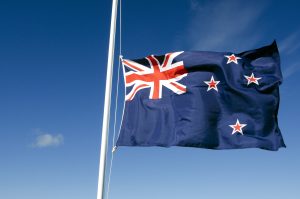New Zealand’s new right-wing government is making dramatic changes to foreign policy. Prime Minister Chris Luxon of the National Party has privileged the priorities of his two coalition partners: New Zealand First and ACT. A core agenda of this coalition government will be to dismantle and undermine progress on Māori rights domestically, and Indigenous rights globally. New Zealand also will invest more in military alliances with the Anglosphere. These policies may also undermine New Zealand’s relationship with Pacific Island countries, which see climate change, not great power rivalries, as their primary security threat.
Under the right-wing coalition, New Zealand will no longer champion Indigenous rights. The new government has declared that it will not recognize the U.N. Declaration on the Rights of Indigenous Peoples (UNDRIP) as “having any binding effect on New Zealand.” New Zealand signed up to UNDRIP in 2010, under a previous center-right government. The new government has also committed to stopping the work of He Puapua, a report commissioned by former Prime Minister Jacinda Ardern in 2019, which provides a legislative roadmap to New Zealand’s realization of the rights of Māori as articulated by UNDRIP. The new government also intends to review the principles of the Treaty of Waitangi, which outlines the rights afforded to Māori. Last week nationwide protests were held in reaction to these policies.
Winston Peters, the leader of New Zealand First Party and the new foreign minister, has been instrumental in this shift. Although he is Māori, Peters advocated strongly against UNDRIP and Indigenous rights during the election campaign, and in coalition negotiations. He will represent a very different New Zealand on the global stage compared to the previous foreign minister, Nanaia Mahuta who was the first Māori woman to hold the role.
Mahuta is the niece of the first Māori Queen Te Arikinui Te Atairangikaahu, who co-signed with Queen Elizabeth II a Treaty Settlement for her Waikato people. Mahuta wears a Moko Kauae (traditional Māori face markings) and explicitly championed Māori values in New Zealand’s foreign policy. In her inaugural speech as foreign minister she emphasized, “The principles of partnership and mutual respect embodied in the Treaty [of Waitangi] provide the foundation for how New Zealand can conduct its foreign policy.”
Mahuta also sought to foster alliances with other Indigenous peoples and Indigenous economies. She supported the Indigenous Peoples Economic and Trade Cooperation Arrangement (IPETCA), an international agreement between Indigenous peoples in Taiwan, Australia, and Canada aimed at strengthening their economic inclusion through trade and investment.
By contrast, Peters is committed to forging closer connections with the United States and questioned New Zealand’s bipartisan commitment to an “independent foreign policy.” He delivered his first speech as foreign minister to the U.S. Business Summit, where he highlighted that “there are few relationships that matter more to New Zealand, than our relationship with the United States.” Peters “warmly welcomed” the opening of new U.S. embassies in the Pacific and expressed his intention to “strengthen engagement with the U.S. on strategic and security challenges” in the Pacific.
New Zealand will likely increase its defense budget and explore signing up to AUKUS. AUKUS is a security agreement between Australia, the United Kingdom, and the United States, centered on a deal to build nuclear-powered submarines in Australia, at the cost of US$250 billion, to “contain” China. New Zealand was not initially invited to join the agreement, despite its close relationship to all three countries, because of its strong nuclear-free policy. However, the new government has expressed interest in exploring cooperation under “Pillar II” of AUKUS. Pillar II envisions cooperation on non-nuclear, advanced military technology, which includes cyber capabilities, artificial intelligence, quantum technologies, undersea capabilities, electronic warfare capabilities, as well as innovation and information sharing.
Yet there are fundamental problems with AUKUS. First, AUKUS escalates tensions and militarization with New Zealand’s largest trade partner, China. Previous governments have tried to stay on side with both the United States and China, and avoid any military stand-off between the superpowers.
Second, AUKUS does nothing to address the Pacific’s number one security threat: climate change. Pacific Island leaders have been critical of AUKUS and regularly highlighted their top priority is addressing climate change, not containing China. Mark Brown, the Cook Islands’ prime minister and Pacific Island Forum chair, has noted that AUKUS “will lead to an escalation of tension, and we’re not happy with that as a region.” New Zealand is a member of the Pacific Island forum but looks set to undermine the Forum’s priorities in that regard.
Peters, when he was previously foreign minister (2017-2020), was committed to building “deeper, more mature political partnerships with Pacific island countries.” He led the Pacific Reset, which was driven by five principles: “understanding, friendship, mutual benefit, collective ambition, and sustainability.” Peters has also highlighted the need to enhance “the effectiveness of Pacific regional organizations to better respond to shared challenges.” Hence, there is a precedent and potential for this New Zealand government to take a different approach based on regional solidarity.
However, the initial statements from the Luxon government see New Zealand playing a very different role in the world. New Zealand looks likely to dismantle the frameworks that protect the rights of Māori, undermine UNDRIP and weaken international alliances of Indigenous peoples. Instead, Peters will realign New Zealand toward the Anglosphere, closer to the United States, and may invest in military alliances that undermine Pacific Island countries’ top priority: tackling climate change.
































